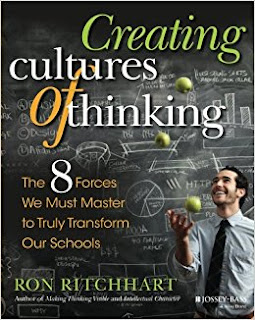What Story Are We Telling?

This summer our Lower School faculty and staff all read the book Creating Cultures of Thinking by Ron Ritchhart.
We currently have 12 teachers across grade levels and disciplines enrolled in an online course through Harvard's Project Zero to delve more deeply into ideas connected to the text. Early in the book Ritchhart defines culture as the enactment of a story:
Each and every day, year in and year out, students are being told a story of learning. Enculturation is a process of gradually internalizing the messages and values, the story being told, that we repeatedly experience through interaction with the external, social environment. (p. 20)
He challenges us to think about three stories of learning:
The first is the old story--that is, the story each of us was told as a student. The second is the current story dominant in schools and classrooms today. The third is the new story we want to be telling. (p. 21)
As your child launches into this new school year and your family gets to know a new classroom, new teachers, new community relationships, these questions seem worth asking both teachers and parents:
What is your 'old story?' What messages did your schooling and family give you about learning? How does this old story influence your expectations of school and learning, positively or negatively? What parts of your old story do you welcome, and what parts do you work to transcend?
What is the 'new story' you hope for your child? What has your life experience taught you about what makes someone a learner, thinker, and engaging adult? Where do you see these qualities reflected in your child's current classroom experience or home life? Where is there room to expand this story, and what would this look like?
Throughout the year we plan to use this space, The Confluence, to help tell the current story enacted in Lower School. We'll also use it to dream together about what our new story could become. We hope if there are aspects of this story you'd like to see, things you value like collaboration, analytic thinking, problem solving, etc., that you'll let us know so we can bring you examples of this work in action:
Kirstin McAuley, Beginning Years (PreK-Grade 1)
Chris Thompson, Intermediate Years (Grades 2-5)
We are excited to be on this journey with you!
You can read Chapter One of Creating Cultures of Thinking here.
Comments
Post a Comment